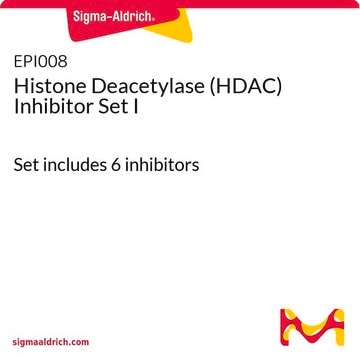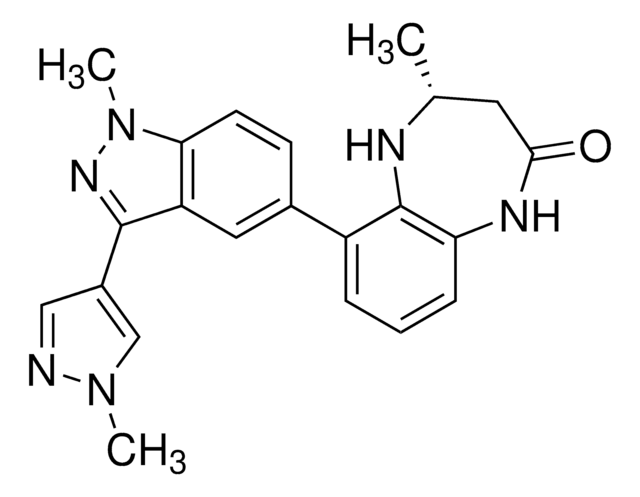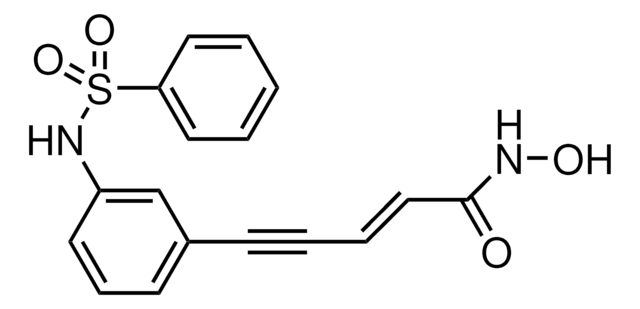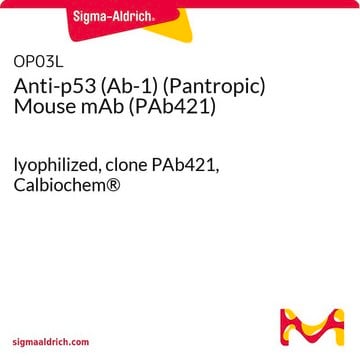SRP0329
PADI-4 human
recombinant, expressed in baculovirus infected Sf9 cells, ≥65% (SDS-PAGE)
Sinónimos:
Peptidyl arginine deiminase, type IV
Iniciar sesiónpara Ver la Fijación de precios por contrato y de la organización
About This Item
UNSPSC Code:
12352200
NACRES:
NA.32
Productos recomendados
biological source
human
recombinant
expressed in baculovirus infected Sf9 cells
assay
≥65% (SDS-PAGE)
form
aqueous solution
mol wt
75 kDa
packaging
pkg of 10 μg
NCBI accession no.
UniProt accession no.
shipped in
dry ice
storage temp.
−70°C
Gene Information
human ... PADI4(23569)
General description
PADI4 (peptidyl arginine deiminase 4) gene is localized to human chromosome 1p36, and is one of the four PADIs found in humans. PADI4 protein is composed of 663 amino acids encoded by 2238 base pairs of PADI4 cDNA. This protein is expressed in peripheral blood CD3+ T cells, CD20+ B cells, CD15+ neutrophils and CD68+ monocytes. It is expressed in haematopoietic tissues, such as spleen, thymus, peripheral blood leucocytes, fetal liver and bone marrow.
Application
Useful for the study of enzyme kinetics, screening inhibitors, and selectivity profiling.
Biochem/physiol Actions
PADIs (peptidyl arginine deiminases) are responsible for the post-translational conversion of peptidylarginine to citrulline, in the presence of calcium ions. Citrullination can result in changes in conformational and functional characteristics of target proteins. In individuals with rheumatoid arthritis (RA), this gene is expressed in hematological cells and synovial tissues, and variant in this gene is linked with susceptibility to RA. The expression of this protein is linked with DNA hypermethylation in acute promyelocytic leukemia (APL), and PAD4/SOX4/PU.1 signaling pathway plays a role in committed differentiation of APL cells into granulocytic cells.
Storage Class
10 - Combustible liquids
wgk_germany
WGK 3
flash_point_f
Not applicable
flash_point_c
Not applicable
Certificados de análisis (COA)
Busque Certificados de análisis (COA) introduciendo el número de lote del producto. Los números de lote se encuentran en la etiqueta del producto después de las palabras «Lot» o «Batch»
¿Ya tiene este producto?
Encuentre la documentación para los productos que ha comprado recientemente en la Biblioteca de documentos.
Localization of peptidylarginine deiminase 4 (PADI4) and citrullinated protein in synovial tissue of rheumatoid arthritis.
Chang X et al
Rheumatology (Oxford, England), 44(1), 40-50 (2005)
Functional haplotypes of PADI4, encoding citrullinating enzyme peptidylarginine deiminase 4, are associated with rheumatoid arthritis.
Suzuki A et al
Nature Genetics, 34(4), 395-402 (2003)
Rachida Nachat et al.
The Journal of investigative dermatology, 124(2), 384-393 (2005-01-29)
Post-translational conversion of arginine to citrulline residues is catalyzed by peptidylarginine deiminases (PAD). Although the existence of five isoforms of PAD has been reported in rodents and humans, their tissue distribution, substrate specificity, and physiological function have yet to be
T Kanno et al.
The Journal of investigative dermatology, 115(5), 813-823 (2000-11-09)
Peptidylarginine deiminase catalyzes the post-translational modification of proteins through the conversion of arginine to citrulline in the presence of calcium ions. In rodents, peptidylarginine deiminase has been classified into four isoforms, types I, II, III, and IV, which are distinct
Yanming Wang et al.
Science (New York, N.Y.), 306(5694), 279-283 (2004-09-04)
Methylation of arginine (Arg) and lysine residues in histones has been correlated with epigenetic forms of gene regulation. Although histone methyltransferases are known, enzymes that demethylate histones have not been identified. Here, we demonstrate that human peptidylarginine deiminase 4 (PAD4)
Nuestro equipo de científicos tiene experiencia en todas las áreas de investigación: Ciencias de la vida, Ciencia de los materiales, Síntesis química, Cromatografía, Analítica y muchas otras.
Póngase en contacto con el Servicio técnico








